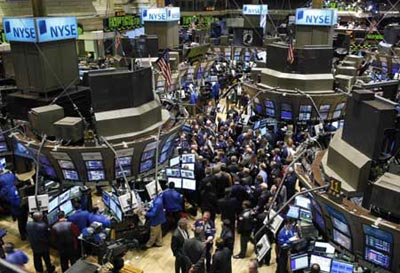Thursday, 12 March 2015 03:28
 NEW YORK: The euro slumped to a 12-year low against the dollar on Wednesday, driving European stocks higher as shares of big exporters gained, while U.S. stocks slipped on concern over when the Federal Reserve would begin to raise U.S. interest rates.
NEW YORK: The euro slumped to a 12-year low against the dollar on Wednesday, driving European stocks higher as shares of big exporters gained, while U.S. stocks slipped on concern over when the Federal Reserve would begin to raise U.S. interest rates.
Divergent policies, with the European Central Bank becoming more accommodative by buying bonds and the Fed poised to raise rates possibly as early as June, pushed yields on euro zone bonds lower and those on U.S. government debt initially higher.
The euro extended its decline to below $ 1.06 for the first time since early 2003 as yields in the euro zone collapsed more than 1 percent. Yields on German 30-year government bonds are now lower than those on U.S. two-year paper.
Expectations the Fed will end its near-zero rate policy given a tightening labor market propelled an index which measures the dollar against six major currencies to an almost 12-year high.
The drop in euro zone yields helped lift Germany’s DAX stock index, which includes big exporters Volkswagen and BMW, to a record high. The index has surged 20.6 percent so far this year.
U.S. stocks closed lower after trying to recover in a see-saw session a day after the S&P 500’s biggest one-day drop in two months, having fallen a similar amount Friday.
“It’s all about rates. I think many are holding onto the view that if the Fed raises rates, stocks stop in their tracks and reverse and the bull market ends,” said Bruce Zaro, chief technical strategist at Bolton Global Asset Management in Boston.
U.S. stocks marked the sixth year of the bull market this week after the nadir of the financial crisis on March 9, 2009.
The Dow Jones industrial average closed down 27.55 points, or 0.16 percent, to 17,635.39. The S&P 500 fell 3.92 points, or 0.19 percent, to 2,040.24 and the Nasdaq Composite lost 9.85 points, or 0.2 percent, to 4,849.94.
In Europe, stocks rallied. The broad pan-regional FTSEurofirst 300 index of leading shares closed at 1,574.45, up 1.46 percent to levels last seen in October 2007.
The major stock indexes for Germany, France and Italy all rose more than 2 percent.
MSCI’s all-country world index, a measure of stock performance in 46 countries, slipped 0.15 percent, pulled lower by the slide on Wall Street.
The euro was broadly lower, slumping to a seven-year low against sterling at 70.145 pence and a 20-month low against the yen of 127.64 yen.
The euro was down 1.41 percent to $ 1.0546, up from a low of $ 1.0512. The dollar gained 0.21 percent to 121.39 yen.
U.S. Treasury debt carrying relatively high yields rose for a third straight day after foreigners bid aggressively at an auction of $ 21 billion in benchmark 10-year notes. Prices, which move inversely to yields, had been lower before the auction.
“That is an indication of the demand for our long-dated paper because we yield so much more than the rest of the world,” said Mary Ann Hurley, fixed income trader at D.A. Davidson in Seattle.
Ten-year U.S. Treasuries rose 6/32 in price to yield 2.1086 percent.
The 10-year German bund rose to yield 0.210 percent, having fallen to a record low 0.193 percent. The 30-year German bund yielded 0.663 percent.
U.S. crude prices hit a one-month low after government data showed a U.S. oil inventory build last week, contrary to some expectations for a drawdown.
The front-month contract in U.S. West Texas Intermediate crude settled down 12 cents at $ 48.17 a barrel.
Brent for April delivery hit a one-month low of $ 55.92 but settled up $ 1.15 at $ 57.54.
Copyright Reuters, 2015




























